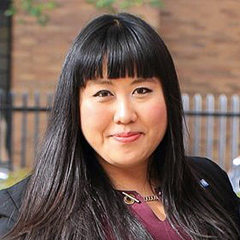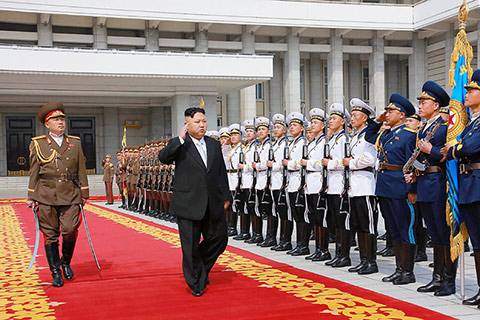Last summer, North Korea tested an intercontinental ballistic missile that experts say could strike Alaska or Hawaii, ratcheting up tensions in the region and beyond. Tina Park, a recent PhD graduate in history who focuses on Korean-Canadian relations, spoke with U of T News writer Geoff Vendeville about the looming crisis.
The war of words between North Korea and the U.S. heated up this summer and fall. Are we headed for an actual war?
Despite the bellicose and reckless rhetoric we’ve heard from Donald Trump and Kim Jong-un, nobody can afford another war on the Korean peninsula. South Korea is the 11th-largest economy in the world. Seventy-six million people live on the Korean peninsula. Its small geographic size makes any surgical military option impossible. Most importantly, the South Korean president, Moon Jae-in, has made it absolutely clear that the United States cannot unilaterally engage in warfare on the Korean peninsula.
You seem confident that no one will act irrationally …
The North Korean regime is actually very rational. For it to launch an attack would be suicidal. On the American side, Trump is not the only one who makes decisions. There’s also the Secretary of Defense and the Secretary of State. There’s a whole system of checks and balances.
Have Koreans seen this level of belligerence before?
There’s nothing new about tensions. What’s different today are three things. First, North Korea’s rapid advances in military and cyber-warfare capabilities. Second, President Trump. The American position on North Korea is lacking clarity, coherence and prudence, which contributes to a sense of instability. Lastly, Seoul and Washington differ on how to deal with North Korea. President Moon is pro-engagement and anti-war, and is willing to stand up against the U.S. to promote peace.

You were in Seoul recently. What’s the atmosphere there?
There’s no doubt that North Korea’s rapid progress with intercontinental ballistic missile capabilities and nuclear tests have raised a lot of concerns for the international community. But South Koreans are not easily stirred by provocations coming from the North. Most South Koreans don’t see North Koreans as the “enemy” – if anything, they are troubled by the state of malnutrition and human rights violations under the brutal dictatorship. President Moon’s recent announcement for an $8-million aid package to be used for food and medical supplies was widely supported by the South Korean public because they recognize that the humanitarian crisis in North Korea is the real problem.
What does the average North Korean know about their country’s missile program and sabre-rattling with the U.S.?
North Koreans are brainwashed from birth about the perpetual threat posed by the United States. North Korea is a truly Orwellian society, where the state has absolute control of how the general population thinks and operates. The regime has justified its disproportionate spending on guns over bread as a survival tactic – that nuclear weapons provide the only deterrence against the American threat. The latest tweets from President Trump provide excellent sound bites for the Kim regime to justify further spending on its military.
Trump wants China to impose economic sanctions on North Korea. Is this likely to happen?
China enjoys unique leverage over North Korea because at least three-quarters of North Korea’s official trade involves China. But China has not strictly enforced UN sanctions because of the fear of regime collapse, which could lead to an influx of refugees into China as well as potential reunification of the two Koreas and an expansion of American influence in Northeast Asia. We should not view China as a monolithic entity – the foreign ministry, businesses and politicians all have different goals and interests when it comes to North Korea. Any solution will require a multilateral approach. The U.S. cannot force China to adopt a certain course of action. It needs to negotiate.
Where do you see a solution?
Diplomacy is the only viable option. We need a peace treaty on the Korean peninsula to break the vicious cycle of provocations and condemnations and to guarantee a “no first-use” rule when it comes to nuclear weapons. At the end of the day, the Korean people must be in the driver’s seat when it comes to finding peace and stability. But we also need a coherent and long-term strategy from the international community to deal with security threats posed by North Korea.
What role, if any, should Canada play?
There is a great need for an honest broker to mediate the different interests of regional players and to broker a final peace agreement between the North and the South. Canada has a wealth of experience negotiating peace. We should also be more engaged with the humanitarian crisis in North Korea. There is a severe shortage of food and millions of people are dying from malnutrition. North Koreans live under severe oppression – many face torture and forced labour. If we are serious about our pledge of “never again,” Canada should really speak up and punch above its weight in terms of humanitarian aid.
With files from Scott Anderson
Recent Posts
People Worry That AI Will Replace Workers. But It Could Make Some More Productive
These scholars say artificial intelligence could help reduce income inequality
A Sentinel for Global Health
AI is promising a better – and faster – way to monitor the world for emerging medical threats
The Age of Deception
AI is generating a disinformation arms race. The window to stop it may be closing





